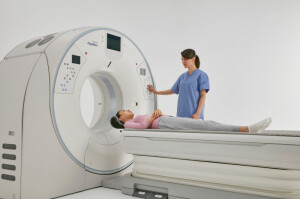por
Lisa Chamoff, Contributing Reporter | October 15, 2018
From the October 2018 issue of HealthCare Business News magazine
Though the technology has been around for more than a decade, spectral CT is starting to gain ground in the CT market. Many of the new releases over the last year tout spectral imaging capabilities, meant for cancer detection and cardiovascular applications.
At the same time, manufacturers are improving workflow and software companies are helping providers get critical reimbursements while lowering radiation dose.
Here’s what’s new from the major CT players:
Canon Medical Systems USA
In April 2018, Canon Medical Systems USA received FDA clearance for its Aquilion Precision CT system. The scanner has an ultra-high-resolution detector with more than twice the resolution that is able to detect much smaller abnormalities – as small as 150 microns – and is part of a trend toward using CT for cancer detection and management, said Dominic Smith, senior director of the CT, MR and PET/CT business units for Canon Medical Systems USA Inc.
At last year’s RSNA, the company released the Aquilion Prime SP, a 160-slice all-purpose CT scanner that can be used for advanced cardiac care.
Last fall the company also released an updated version of its Aquilion ONE GENESIS, with a technology that improves image quality in brain scans and for cardiac imaging.
Smith said the changes were prompted by new guidelines for the management of patients with stroke from the American Heart Association and American Stroke Association, which recommended CT over MR when triaging such cases.
The scanner’s Neuro FIRST MBIR application improves high-contrast spatial resolution and low contrast detectability in the brain, which allows physicians to possibly see early signs of stroke.
Aside from the buzz around the rise of spectral CT, a technology that has been around for the last decade, artificial intelligence is the next frontier for CT, and the company plans to release more information related to AI initiatives at this year’s RSNA.
“Our technology is built so that it’s AI ready,” Smith said. “AI is the next big trend that will impact all diagnostic imaging technology.”
CurveBeam
CurveBeam, which specializes in cone beam CT diagnostic imaging for the orthopedic market, received FDA clearance in May 2018 for its LineUP scanner, which provides weight-bearing imaging of the knee and lower extremities.
